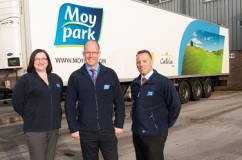Industry News
New facility is being designed around MM (UK) and MM Flowers’ future plans, and incorporates the latest processes, techniques and features.
A move to a new hi-tech site with more space for R&D would “sustain and secure” the future of Muñoz Group subsidiaries MM (UK) and MM Flowers.

The plans are still in the development stage, with Muñoz Group first needing to get planning permission from Huntingdonshire District Council before it purchases the land it requires for the development.
The proposed relocation to the site on an old military airfield at Alconbury Weald in Cambridgeshire may also see the closure of the firms’ operations at their present office in nearby Chatteris “in their entirety”.
As for where this would leave current employees based there, Andrew West, head of human resources at MM (UK) and MM Flowers, told FPJ: “We hope to be able to offer suitable alternative roles to as many of our Chatteris staff as possible, and we have chosen the new location because it should be a commutable distance – only 20 minutes from the current location – to travel for the majority of our current employees.”
Describing the plans in more detail, West said: “The new facility is being designed around our future plans, and incorporates the latest processes and techniques. It has also been designed around our people and the way we work to create a great working environment.
“In order to grow we need to retain the team that have got us to where we are, and also attract the best and brightest talent, and we believe the new site will enhance our ability to do this. The decision to relocate and design a bespoke solution has also been driven by a requirement to provide our customers with transparent supply chain solutions that step change quality for the consumer.”
He also cited the benefits the business will get from the mooted move in terms of the new site providing greater opportunity for economies of scale, and more assurances on “cold chain integrity”.
However, he dismissed local media reports that the new facility – which it is working towards getting with property development firm Urban and Civic, which is in charge of developing the site in question – will create 500 new jobs as erroneous.
West said the Chatteris base does not give the business the space and flexibility it needs to deliver its strategic plans for the future, and noted that Alconbury Weald is closer to the main transport arteries of the A14 and A1(M).
The Tesco-dedicated fruit supplier AMT Fruit in Newmarket would not be affected by the move, which West hopes to have completed by the end of summer 2016
Severe flooding in Cumbria and Lancashire has left thousands of residents without power and major disruption to road and rail traffic
A Tesco Superstore and a Sainsbury’s in central Carlisle are under water following severe flooding in Cumbria and Lancashire that has left around 10,000 homes without electricity.

Storm Desmond saw around 340mm of rain fall in 24 hours, according to provisional figures reported by BBC News, which would be a new British record if verified.
Helicopter footage tweeted by Tesco shows the retailer’s store at Warwick Road, Carlisle, surrounded by deep water, while another image posted by a member of the public shows similar flooding at the Sainsbury’s.
Road and rail services have been severely disrupted with no trains running between Carlisle and Scotland today (7 December) due to flooding and a landslip.
Livestock has been left stranded, while the B5295 bridge at Braithwaite and Pooley Bridge in the Eden District have been washed away.
Fruit and veg wholesaler A Stephenson, based in Appleby-in-Westmorland, which has been affected by the floods, tweeted that its warehouse is open as usual, although its retail store is without power.
John Leyland, deputy director of operations at the Environment Agency told the BBC that the amount of rainfall was “beyond the forecasts” and the model used by the EA to trigger flood warnings does not account for persistent heavy rain.
Environment minister Liz Truss this morning chaired an emergency meeting of the Cobra committee. In a statement she said flood defences performed as they were designed to, but exceptional rainfall had led to defences being breached.
“Storm Desmond has largely passed, but rivers remain swollen and the ground is saturated by the significant volumes of rain we have seen in recent weeks,” she said.
“In particular, we are carefully monitoring the situation in Carlisle and York where river levels have not yet reached their peak.”
Fresh meat and poultry sales have seen another decline in value sales. According to Kantar Worldpanel’s Meat, Fish & Poultry Market update for the 3 months to 8 November 2015, value sales dropped 0.7% while volume sales saw modest growth at 1.5%.

Lamb had a strong performance in the last 12 weeks compared to 2014, attributed to a strong performance from leg roasting joints. Pork saw continued decline in both value and volume, with 560,000 fewer households buying compared to last year.
Kantar Worldpanel added that British Sausage Week failed to drive sales, with the sausage category seeing a -4.7% and -6.8% decline in value and volume sales respectively. However, burgers and grills grew over the same period, experiencing a 7.3% increase in value sales and a 10.8% jump in volume sales.
While the Kantar Worldpanel data doesn’t take into account the impact of the recent World Health Organisation study into red and processed meat, IRI Retail Advantage, which measures sales across the major retail multiples, showed that since the week of the report (w/e 31 October) and the following week (w/e 7 November), losses in sales of sausages and bacon were estimated to be £3 million.
IRI reported that value sales of pre-packed sausages saw a decrease of -15.7% for w/e 31 October compared to the same week of last year while pre-packed bacon saw a steeper decline, with sales down -17%. The product has fallen -6.5% in the past quarter, and -5.6% in the last year, which is equal to a 10% fall in sales as a result of the WHO report.
Mike Corbett has joined the retailer, Tesco after former company CFUK’s restructure meant TD role was made redundant

Mike Corbett has left his position as technical director at tropical fruit supplier Compagnie Fruitiere UK (CFUK) after a company restructure meant his role was “made redundant”.
Corbett, who was at the company for four and a half years, is now working for Tesco as technical manager for ambient salads. He will be based at the retailer’s Cheshunt headquarters before moving to Welwyn Garden City when the company relocates.
“Due to recent restructures within the company, it was with regret that Mike’s position of technical director was made redundant,” a spokesperson from CFUK said. “It was a pleasure to have worked with Mike and we wish him every success in his new role.”
CFUK procurement manager George Beedell has also left the business. He had been in the role for four and a half years.
George Perry will provide free produce to children at its Joe Richards Midlands grocery chain to encourage healthy eating

Birmingham wholesaler, George Perry has begun offering free fruit to children at its Joe Richards retail and grocery stores to encourage healthy eating.
The initiative will take place at the firm’s six existing shops at Earlsdon, Erdington, Harborne, and Daventry Road in Coventry, Kenilworth and Tamworth, as well as its new shop at Ball Hill in Coventry.
George Perry managing director Mark Tate said: “It’s through educating and encouraging our children on what to eat now, we will drive obesity down and with the backing of schools and the government, encourage exercise and a general healthier lifestyle.
“Using the shops, we now have the medium to push this forward. Fingers crossed others may follow our venture.”
George Perry has also launched a new online wholesale service, via its new website and Click & Collect Fresh system, which Tate said he sees as “the future of the markets”.
Retailers not supporting Britain’s high-welfare pig farmers this Christmas season can expect to be named and shamed by the National Pig Association (NPA).

Those that put in a bulk Christmas order from countries with lower animal welfare standards, or provide misleadingly labelled gammons, will be made known to the public.
“In addition to carrying out our own checks, we are asking shoppers to check gammon labels carefully this Christmas to ensure the product they buy is made from cured British leg of pork, and not from imported pork that has only been cured in Britain,” said NPA chairman Richard Lister.
NPA’s Christmas “GammonWatch” campaign is conducting surveys across the country, with their findings being reportedly published in weekly bulletins until Christmas
“If our prices fall any further we will see more pig farmers freezing all investment in new buildings next year and others quitting altogether, and either route will be a serious blow to an industry that is known the world over for its high-welfare, high-quality product.”
According to NPA, only 30% of gammon currently available on the market during the festive season is British, this is despite there being plentiful supply from producers.
Dr Zoe Davies, NPA chief executive, believes the British public will be willing to pay extra for high-quality products: “We know from successive surveys that customers prefer to buy British pork and pork products even if it costs a penny or two more for the extra quality we offer,” she said. “This is especially true since horsegate in 2013 when most retailers sought to reassure customers by promising to stock more British meat.”
NPA’s Christmas GammonWatch will also include a special PorkWatch survey in December. PorkWatch is the industry’s bi-monthly survey of British pork, bacon, ham, sausage and, as of next month, gammon facings in supermarkets.
And the number is even higher than that in certain parts of the UK, according to research by breakfast firm
Two in five Brits have admitted to regularly skipping breakfast – twice as many as just three years ago.

Despite breakfast being widely regarded as “the most important meal of the day”, two in five of those surveyed as part of the Flahavan’s research said they didn’t bother to make time for breakfast, compared with one in five Brits in the same survey in 2012.
The figures were found to be even worse in the north-east of England and Northern Ireland, where only around half of those surveyed by the oat producer claimed they had breakfast each day.
But in the east of England and in Scotland, nearly 70% found the time to eat every morning. Around 2,000 people took part in the research.
Flahavan’s nutritionist Lucy Jones said: “Breakfast really is an important part of the day, and missing out on a nutritious start to the day can affect your health and your mood.
“A balanced breakfast helps to fuel you through the morning, meaning you feel fuller for longer and are less likely to snack on unhealthy foods throughout the day.”
The Flahavan’s study showed that cereal, porridge and toast remain the nation’s most popular breakfasts. And half of those surveyed said they regularly topped porridge, toast and cereal with healthy additions such as nuts, seeds and berries.
Meanwhile, one in 10 of those surveyed said they liked to try at least one new healthy food each month.
Supermarket giant set to pump £6 million into the development of the artisan business, which has seen losses increase after a rapid expansion
Tesco’s artisan coffee business Harris + Hoole has seen its pre-tax loss double, following a rapid expansion of the business.
The trendy chain opened 22 new shops in the most recent financial year, taking the total number of stores it has to 45.

The business posted a pre-tax loss of £25.6 million in the year ending 1 March 2015, compared to £12.8m for the year ending the 23rd of February 2014, accounts held at Companies House reveal.
The accounts also reveal that the business is set to need £6m of further funding from Tesco up to the end of 2017 in order to meet its financial obligations.
Speaking in the report accompanying the accounts, the directors noted: “The UK coffee market is highly competitive and already served by a number of international, national and local competitors.”
Tesco has reportedly so far committed to continue to provide financial support for at least another 12 months, and has said it intends to support up to £7.5m of funding, according to the Daily Telegraph.
The supermarket is also not seeking the repayment of its existing £48m loan to Harris + Hoole, and the interest it is owed by the business for the next year.
Tesco’s former chief executive Philip Clarke identified the business’ investment in Harris + Hoole as an opportunity to drive footfall into its Tesco Extra stores, as well as it providing an opportunity to tap into the growing casual dining scene.
The man previously in charge of Tesco’s collection of in-store restaurants and coffee shops, Michael Holmes, was ousted in March as part of new CEO Dave Lewis’ personnel clearout.
Moy Park has announced a massive £10 million investment, which will lead to the creation of 100 new jobs.
The investment covers the Ashbourne area in Derbyshire and covers both its Ashbourne hatchery and processing facility.

As a result of the investment, the company will be able to increase processing capacity to over one million birds per week with the installation of a new cutting line, processing equipment and refrigeration chilling technology.
“This is a really exciting development for Ashbourne, which will see the hatchery and the factory transformed into state-of-the art facilities employing the most technologically advanced equipment,” said Alan Gibson, Moy Park UK and Ireland director.
In addition, Moy Park has announced an investment programme at its Ashbourne hatchery. This will lead to an increased capacity of 1.2m chicks per week, allowing Moy Park to meet an increasing demand for high-quality, locally sourced poultry products for its customers.
The investment programme is part of Moy Park’s wider growth strategy. In order to deliver the best possible products to its consumers, the company has already made significant investments in its farming and operational facilities.
“This multimillion pound investment will meet the highest standards of animal welfare, hygiene and biosecurity,” added Gibson.
“We are committed to providing a best-in-class service for our customers and leading the way in terms of product quality and innovation. These investments are a very positive development for Ashbourne and there is a great feeling of optimism amongst the team as we position the business for continued growth,” he added.